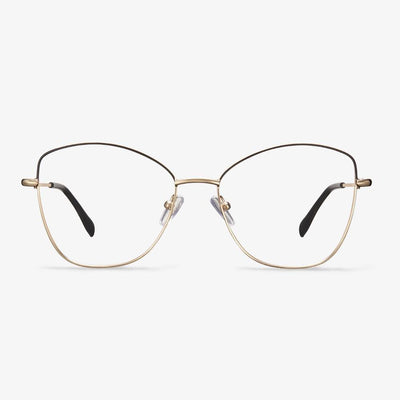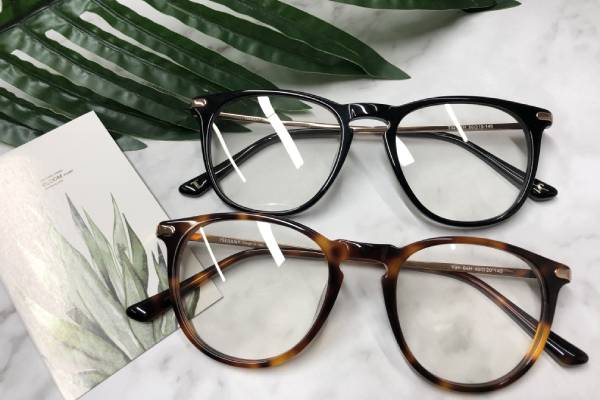Who is suitable to wear progressive lenses
Progressive multifocal glasses are suitable for people with presbyopia or visual fatigue, especially teachers, physicians, musicians, computer operators, etc. They not only need to see far and near objects, but also most of the time, need to see objects at intermediate distances such as blackboards, piano scores, and computer screens. A pair of scientifically customized progressive multifocal glasses can simultaneously meet the needs of distance use, near use, and various distances in between. Some special young myopia patients wearing progressive multifocal glasses can also be used to correct the refractive power and effectively relieve eye fatigue.
What Is Plastic Lens?
In the above part, we have introduced what polycarbonate lenses are. In this section, we will show you what the plastic lens is.
The plastic lens was first introduced in 1947. Since then, plastic has become a popular and widely used material for making eyeglasses lenses. Since the introduction and use of plastic lenses, it has sealed its mark as the most preferred choice in the optical industry.
Plastic lenses are light. With this feature, plastic lenses are popular because they will not be heavy inside the glasses frame and permit for an easy fit in any type of glasses frame. In addition, plastic glasses are cheap and easy to obtain in desired amounts. So, they are affordable for most people. Plastic lenses are very durable. So, they do not shatter easily on impact which makes it a great choice for individuals who are active or tend to drop their glasses often.
However, compared with other lens materials, plastic lenses are usually thick due to their low index of refraction. The soft feature of plastic glasses makes them susceptible to scratching from a sharp object and why scratch-resistant coating is applied to form an additional protective layer. Plastic lenses do not provide ultraviolet protection.
Disadvantages of bifocal glasses
The disadvantage of bifocal glasses is that the different areas are clearly spaced and the appearance is not beautiful. The medium distance is fuzzy, and the adaptation period is needed, there is a prismatic jumping phenomenon. The focal distance between the upper and lower lenses is different, with a clear dividing line. The main disadvantage is that when the line of sight moves from far to near, there will be interference like jumping, and the middle distance object image is blurred. Students can adapt to sitting still in a class by wearing bifocal glasses, but they can only wear glasses when they are in class or studying because of the inconvenience and even danger caused by the interruption of the glasses.
How to Pop Lenses Out of Glasses with Metal Frames?
As is well known, glasses frames are different due to the frame materials. So, we will show you how to pop lenses out of glasses with metal frames and plastic frames. First, we will show you how to take lenses out of glasses.
Now, here is the tutorial.
- Find out the screws and they are usually near the nose bridge. They may also be present at the bottom rim on the outside. Once you find out the screws, find a suitable screwdriver.
- Then fix the frame in one hand and turn the screws in an anti-clockwise direction as they come out completely. Be sure to do this over a cloth where you can easily collect the screws and then store them somewhere safe to be used later.
- Next, put one hand on the nasal side of the frames and use the thumb and fingers of your other hand to pull out the frames. Be sure to use any piece of cloth so that you do not get fingerprints on the lens.
After all steps are finished, you can successfully remove the lenses from the glasses.
Types of Progressive Lenses
At the same time, there are different types of progressive lenses and they are standard PALs, short corridor PALs, computer PALs, and Reading PALs.
Standard PALs must fit your vision needs. They can be added to frames of your choice, but you need to ensure that the frames are the right width and height proportions to grant enough space for the gradient changes in the lens.
Short corridor PALs are made to fit into smaller frames so as to suit a wider range of eyewear styles.
Computer PALs are designed for computer users and other occupations that require strong intermediate and distance vision.
Reading PALs are designed for those who enjoy reading and they can opt for a pair of lenses with a larger close vision zone.
America's Best
America's Best is part of National Vision, one of the largest and fastest-growing eyewear retailers in the United States. It has more than 800 stores in 31 states and the District of Columbia and is adding more stores every year. The mission is to provide the best value for quality eye care and glasses at a low price that America deserves. All divisions of the company are committed to delivering this commitment to customers. Prices are usually lower than those of their competitors. They provide an extensive collection of designer eyewear frames like Ray-Ban. Due to bulk purchasing power, they can provide favorable price designer brand glasses. Each store is equipped with state-of-the-art optometry equipment to ensure customers receive the best eye care. They use cutting-edge manufacturing technology to provide customers with the highest quality products at the lowest price in the shortest time.
Refractive index of spectacle lens
It is generally believed that the higher the refractive index, the better the spectacle lens. Such spectacle lenses are relatively thin, and of course, the price is a bit expensive. When the refractive index increases, the direction of the light entering the lens will change greatly, the focus will move to the lens, the focal length will be smaller, and the diopter will become larger. In order to keep the diopter unchanged, it is necessary to reduce the curvature of the lens, that is, to reduce the curvature of the mirror surface, so that the thickness of the lens can be reduced. This is why the larger the refractive index, the thinner the lens is. Under the same premise of other things, the larger the refractive index, the thinner the lens, the lighter and more beautiful the lens, and the higher the price, but the larger the refractive index is not the better.











































